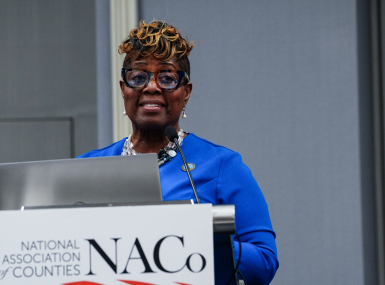Ventura County partnership helps seniors manage depression

Key Takeaways
A majority of Americans 65 and older believe it’s “normal” to get depressed with age, according to the National Institute of Mental Health. Ventura County, Calif. is aiming to shift that mindset through its Program to Encourage Active, Rewarding Lives (PEARLS), a partnership between the county’s agency on aging and behavioral health department.
PEARLS pairs interested Ventura County residents ages 60 and older with social workers, who work with the seniors to identify the sources of their depression and ways to manage it over the course of eight home-visit counseling sessions, according to Jason Sagar, the agency on aging’s program manager.
For many, the holidays exacerbate feelings of loneliness and isolation. A National Alliance on Mental Illness survey found that 64% of Americans with mental illness reported their conditions worsened around the holiday season.
“A lot of our clients are definitely isolated,” Sagar said. “They might not have family members around anymore and that’s a big part of one of the reasons that they’re feeling the way they feel, so some of the things that we try to do is get them back out into the community.”
PEARLS acts as a “problem-solving treatment” for older adults to manage their depression and isn’t intended for people expressing signs of suicidal ideation, who the agency refers to more intensive counseling through the behavioral health department.
“It’s very active,” Sagar said. “They get their own homework assignments, ‘These are the things I have to work on,’ and then the next session, they go over, ‘OK, what have you done? What can we do more about this?’”
Plans are personalized to each client, so the first steps can be anything from a senior taking up a new team sport to just making sure they leave their home, Sagar said.
“Sometimes, they’re so critical in their needs that we’ll start them off with, ‘Maybe today, let’s just start with you just going and stepping outside,’ Sagar said.
“That’ll be basically the first step and then we can work with that afterwards.
“… A lot of symptoms of depression are because of being overwhelmed with something or dealing with something that is just making them sad, so giving them the tools to actually take action on their issues is what we look for and what we strive to help people have positive outcomes.”
Late-life depression affects around six million Americans ages 65 and older, but, according to WebMD, only 10% get treatment, which is largely attributed to the stigma of seeking help for depression, which seniors disproportionately feel compared to younger generations.
According to the Substance Abuse and Mental Health Services Administration, older adults are at least 40% less likely to seek or receive treatment for mental health conditions than younger individuals.
Sagar said meeting the seniors at their homes for the counseling sessions helps alleviate that stigma and makes them feel more comfortable. If home visits aren’t possible, the counseling sessions are conducted by phone.
“There is a stigma out there about going to counseling or therapy,” Sagar said. “… Our staff is mainly social workers, it’s a more personal experience, so we’re not there to provide them the traditional counseling … it’s more ground level, foundational.”
PEARLS is a national evidence-based program that reduced depressive symptoms by at least 50% over 12 months in patients involved in a trial conducted by the University of Washington’s Health Promotion Research Center and the City of Seattle’s Aging and Disability Services.
Sagar said Ventura County has seen overwhelmingly positive results as well, with 83% of clients reporting “a more positive outlook on life and better situations” following the eight counseling sessions.
A PEARLS client who wished to remain anonymous said the program made her “hopeful,” and that she’s since gotten more into cooking and started going to the local senior center, where she hopes to do art.
“The program is wonderful,” she said. “… My [social worker] set goals, and I’m a goal person, I’m a retired teacher ... I think one of the main reasons I liked it is because the counselor I had believed in me.”
Related News

National Association of Counties Launches Initiative to Strengthen County Human Services Systems
The National Association of Counties (NACo) announces the launch of the Transforming Human Services Initiative, a new effort to help counties modernize benefits administration, integrate service delivery systems and strengthen county capacity to fulfill our responsibility as America’s safety net for children and families.

Congress seeking ‘common-sense solutions’ to unmet mental health needs
Rep. Andrea Salinas (D-Ore.): “Right now, it is too difficult to access providers … and get mental health care in a facility that is the right size and also the appropriate acuity level to meet patients’ needs.”

Prince William County transforms crisis care through "No Wrong Door" approach
Prince William County, Va.’s Crisis Receiving Center is bridging the gap between emergency room care and traditional outpatient care in behavioral crisis response and reducing burden on local law enforcement and hospitals.
Featured Initiative
2024 NACo Achievement Awards
Since 1970, the NACo Achievement Awards have recognized outstanding county government programs and services. Through a non-competitive application process, noteworthy programs receive awards in 18 categories that cover a vast range of county responsibilities.

